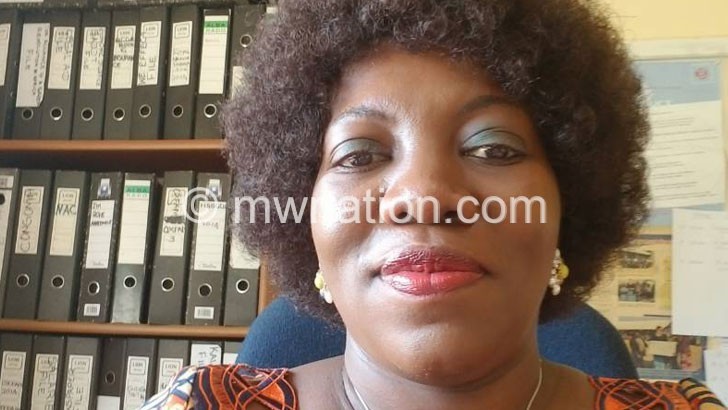Women lobby for female Speaker
Women’s rights activists have launched a push for newly elected legislators to vote for a female Speaker of Parliament when the National Assembly elects the Speaker, First Deputy Speaker and Second Deputy Speaker next week.
In separate interviews yesterday following a social media lobby for a female Speaker by some activists, the activists said it was high time the country entrusted the responsibility of heading one of the three arms of government, the Legislature, in a woman.
Women’s Legal Resource Centre (Worlec) executive director Maggie Kathewera Banda, in a telephone interview yesterday, said the campaign for a female Speaker of Parliament was gaining momentum.

She said: “As Worlec, this has been an ongoing campaign which started way back before the elections. We have been engaging political parties through the offices of their secretaries general.
“Now, we are going to do the same now that the elections are over and the election of the Speaker is at hand. We believe that direct lobbying is critical unlike the social media campaign.”
Parliament has set June 17 and 18 as dates for swearing in the 2019-2024 cohort of legislators.
Clerk of Parliament Fiona Kalemba said in a statement last week that the legislators’ oath of office will be followed by election of the House’s Speaker, First Deputy Speaker and Second Deputy Speaker.
Kathewera Banda said by electing a female Speaker of Parliament the country would demonstrate symbolism in progression of society and accord a chance to women to make critical decisions at the highest levels.

Women’s rights lobbyist Blandina Khondowe, in a written response, said the campaign to have a female Speaker of Parliament was timely.
“Honestly, I would like to see a female Speaker of Parliament. That would be a huge statement and encouragement to the girl-child,” she said.
Malawi has never elected a female Speaker of Parliament. The closest women have come has been either First Deputy Speaker of Second Deputy Speaker. Female legislators who have previously served in such capacities include Esther Mcheka Chilenje, Loveness Gondwe and Juliana Mphande.
On whether his party would nominate a female legislator for the position of Speaker, Democratic Progressive Party (DPP) spokesperson Nicholas Dausi was non-committal.
He said: “I am not in a position to answer that question.”
Malawi Congress Party (MCP) secretary general Eisenhower Mkaka, in a telephone interview last evening, said the party was not aware of any move by lobby groups for women candidates.
He said: “In MCP, we believe in capacity more than gender. As such, any candidate that demonstrate capacity be it female or male would be our high priority.”
Chilenje, who has reclaimed her Nsanje North seat, is among the names being mentioned as possible candidates for the position of Speaker from DPP.
MCP insiders have also mentioned female legislators such as Catherine Gotani Hara and Nancy Tembo, who won as an independent candidate, among potential candidates.
The new Parliament cycle has 44 female legislators, up from 32 in the 2014-19 Parliament, according to official results announced by the Malawi Electoral Commission (MEC).
In terms of numbers, DPP won 62 seats in the 193-seat National Assembly but at the weekend moved to bolster its parliamentary strength by wooing 30 independent candidates to potentially hit 92. MCP won 55 seats.
Meanwhile, gender activist Emma Kaliya has warned that the battle to have a woman Speaker would not be achieved through goodwill, saying more men were equally positioning themselves to occupy the office.
She said: “The last time for us to have female deputy speakers we had to lobby with critical stakeholders such as parties. The lobby should adopt the same strategy to lobby President Mutharika and the leader of opposition in Parliament, respectively.”
Currently, the Democratic Republic of Congo (DRC), Rwanda and South Africa have female speakers among countries in the sub Saharan Africa region.
Kaliya’s remarks were echoed by 50-50 Campaign Management Agency media consultant Wisdom Chimgwede who called for increased intensity of lobbying on behalf of women candidates for the position.
He said: “Political parties are very critical in this campaign to have a woman Speaker. The process starts with vetting at party level. As such, interest groups must focus their energies towards impressing upon the parties to adopt the campaign.”
Chimgwede said the election of a female Speaker would put the country on the global map for making strides in the promotion of women into political positions.
Sources in DPP indicated that besides Chilenje, other names that have come out prominently include former Cabinet ministers Bright Msaka, Simon Vuwa Kaunda and Jappie Mhango.
On the other hand MCP’s list of likely contestants includes Jacob Hara, Ken Zikhale Ng’oma, Ken Kandodo and Richard Chimwendo Banda.
But in telephone interviews some of the parliamentarians who were reachable expressed surprise at their being mentioned.
Msaka said: “Who told you that [I want to become Speaker]? Ask those who told you, not me. Thank you!”
Jacob Hara, who is Mzimba Solola MP, equally expressed surprise, saying: “It’s news to me. In fact, nobody has approached me. In these matters, it is the people’s will that prevails.”
Chimwendo Banda said he has heard about his name being proposed but said: “I have not taken it too seriously. Politics at that level is something else so I will not say much because no one has formally approached me.”
Election of Speaker
Section 33 of Parliamentary Standing Orders provides procedures for electing the Speaker of Parliament.
The Clerk of Parliament, who acts as the presiding officer, receives nominations before distributing ballot papers for a secret ballot which takes place in the presence of party monitors. The winner is announced based on the first-past-the-post electoral system.





